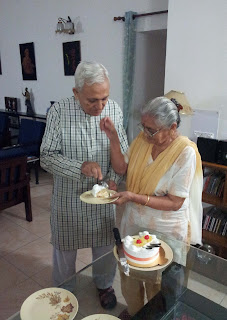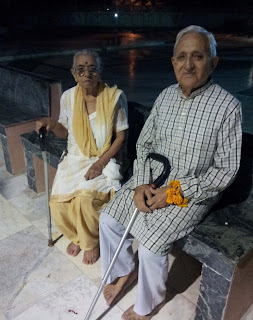I read this book 12 years ago and came across my notes this morning. I think that this book remains a very important work towards understanding the attitudes, inclinations, compulsions and impulses of our nation's middle class. Here are the notes:
The book argues that the lack of social concern of the Indian middle class is detrimental to the health of the nation and the class' own long term interests. The complete apathy towards the unwashed masses as the nation continues to march down the road to become a mere market or aggregation of demands can cause dangerous social upheavals in the future. Excerpts:
The Relevance of Beginnings
The creation of a native elite in its own image was the most spectacular and enduring achievement of British colonialism in India.
The social segment from which these new beneficiaries came represented largely a continuity: middle class Indians from an educated background.......
.....The members of the nascent Indian middle class in the nineteenth century did not feel a sense of humiliation in collaborating with the agencies of British rule. Indeed...they had acquired a stake in the perpetuation of the British rule.
Yet it (the early Indian National Congress) was essentially an upper- and middle class affair...
(The freedom movement led by Gandhi) involved the masses without empowering them.
Through their participation for the struggle for freedom acquired the profile of a mass movement; but essentially the focus of power and control remained where they always have been - with dominant elites.
It was more than evident that both the Hindu and Muslim communities were inegalitarian, and each preserved an elite segment that was less than inclined towards a genuine empowerment of the masses and the inevitable socio-economic destabilization that this would involve. The conjuring up of an external threat to the community enabled these vested interests to divert attention away from pressures from the internal restructuring of their communities.
The Age of Hope
Freedom came in 1947, but the nature of the entrenchment of the middle and upper classes under British rule, and their leadership of the freedom movement ensured that the institutions built up during the colonial era remained largely intact.
Fortunately for the middle class in India, the freedom movement had generated a powerful ethical and intellectual legacy....... This legacy was symbolized in the compellingly charismatic personalities of Gandhi and Nehru.
These (communal tolerance, belief in parliamentary democracy, romanticization of India's past etc) were the elements that coalesced to form the ideological framework of the Indian middle class at the time of independence.
Such parameters of social interaction were linked with another aspect: a conscious ceiling on material wants.... Material pursuits were subsumed in a larger framework that did not give them the aggressive primacy that they have acquired today.
The hold of the past ensured the continuity of traditional religious practices; the aspiration to be modern resulted in these practices surviving only as a mechanical ritual.....The middle class, caught in the penumbra of the past and the present, the traditional and the modern, was unable to develop an authentic paradigm synthesizing both.
It is clear that almost immediately after independence the direction of the State policy was being dictated by middle class interests. (Perpetuation of English, the education system that favoured the few, etc)
The End of Innocence
The war with China in 1962 was the first serious blow to the easy confidence and sense of well being of the middle class.... Educated Indians had caught a glimpse of reality behind the comfort of illusions, and suddenly the institutions and beliefs of the past seemed inadequate when confronted with the uncertainties of the future. Expectations appeared more vulnerable now...
The first trend of importance was the visible retreat of ideology from public life and the corresponding transparency of the quest for power as an end in itself.
.... (It) had the potential for the most deleterious consequences in the long run, was the un-ceremonial burial for the need for a society to have a commitment to some kind of ideological binding....
The Indian middle class' propensity to abjectly capitulate before a paramount leader (of which the apogee would be reached during the Emergency declared by Mrs Gandhi) was thus directly related to the erosion of an ideological commitment as an effective countervailing force...
(Another) factor to critically influence middle-class attitude and behaviour was the legitimization of corruption as an accepted and even inevitable part of society.
The trends we have discussed - the retreat from idealism, the reduced sensitivity to the poor, and the legitimization of corruption - coincided with a change in the character and structure of the middle class itself...the new claimants were...weaned on the pragmatic realism of Indira.
The selective endorsement of some of Mrs Gandhi's actions even at a time when the JP movement had considerable support was not proof of how discriminating middle class was. It was proof, rather of its ideological rudderlessness, where the only compass working was a perception of its own interests and expectations......The middle class was willing to climb onto the 'moral' platform to the extent that this platform could accommodate its discontents. It was happy, for instance, if its anger against the rise in prices could be given a better projection through a 'moral' critique. But it was unwilling to allow its endorsement of the 'moral' to rein in its own proclivities to the contrary. (Shades of the support for the recent Anna agitation against corruption?!)
The obverse side of this 'authoritarian-anarchic' syndrome is the unqualified adulation of a strong leader at the time of his emergence, and the unconcealed glee at his discomfiture at the time of his downfall. Psychology apart, the essential reason for such wild swings of emotion and allegiance is the absence of an ideological mooring....
Middle class Indians saw Rajiv Gandhi through the prism of their own needs.
The truth is that under the garb of social justice the entire Mandal issue was an intra-middle-class struggle for the perks and perquisites that could be seized from the state.
The Inner Landscape
It is a cliche to recall that Hinduism - the religion as it is lived by its countless followers - has no organizes church, no one God, no paramount religious text, no codified moral laws and no single manual of prescribed ritual. The predominant emphasis is on personal salvation, a journey in which the individual is essentially alone with his karmas and his God. There is nothing wrong with such an approach in purely spiritual terms......however, in terms of the individuals relation to the society, this very emphasis on the self as the centerpiece of spiritual endeavour tends to stunt the growth of a sense of involvement in and concern for the community as a whole...A pious Hindu will take a dip in the holy waters of the Ganga totally oblivious to the filth and garbage on and around the bathing ghat...Temples in India will have their coffers overflowing with personal donations from the religiously active, but few of the donors would see much spiritual merit in using the same money for alleviating the misery of the thousands of the visibly poor around them.
A second aspect of Hinduism, of great relevance to our analysis, is the absence in it of a strong and unambiguous single ethical centre. There is nothing in Hinduism which categorically equates any action with sin.....It accepts a moral relativism which refuses to be straitjacketed by simplistic notions of right and wrong.
The absence of a strong moral imperative for social altruism had resulted, under the tutelage of unethical leaders and opportunistic politics, in a horribly bloated unconcern for society itself. The end product was the acceptance of a certain kind of lifestyle: insular, aggressive, selfish, obsessed with material gain, and socially callous.
Did the frenzied absorption in worldly pursuits and the overwhelming preoccupation with material acquisitions reduce the role of religion in the middle-class person's life?.... To some extent it did happen: the frequency of and familiarity with religious ritual was reduced, but paradoxically, the need for the religious identity increased. Breakdown of the extended family.... Induced a hankering for a sense of belonging to some transcendent institution which could,.... resurrect a sense of community.
The complexes the average middle-class person has about sex and its role in the society are a result of all these factors: a past which is remembered or invoked to justify sexual license; a more recent heritage (British and Mughal) which considers the sexual urge wrong and associates it with guilt; and the present which is invaded, as it were, by the expression of sex as vulgarity or, as depicted in Western soap operas, fantasy.
The writing on the Wall
The essential point then is that the current wave of liberalization has deepened the tendency which the wealthy Indian already had to ignore the sufferings of the poor.... Once it becomes legitimate to ignore poverty, the sense of community ceases to have a place in social life.....For the truth is that the social insensitivity of the educated and the privileged Indian is writ large on the face of India, whether the professed goal of the country is socialism or capitalism. The new economic policies have accentuated the insensitivity, and brought into sharp focus the psychological polarization between the worlds inhabited by the rich and the poor.
The seminal question for the middle class is: Can such a polarized world be sustained in perpetuity? Or has the time come for this class, in its own interests, to move beyond the 'margins of elite vision'?
If self-interest, a sentiment with which the middle class is not unfamiliar, can jolt it to pause and reassess its strategies for its own benefit in the long run, then several convincing examples can be given to indicate what is the right track.
The answer appears to be a conscious and quantum increase in voluntary activities outside government, particularly in areas of education, poverty eradication and health. The first reaction of many in the middle class will be to dismiss such an idea as idealistic fantasizing. But the proposal is not as unrealistic as it may sound. The elite in the country have always had considerable influence on middle-class aspirations. Within the elite there are quite a few.........that demonstrate a much-required sense of social purpose.....If such examples of social concern by the corporate elite can be expanded manifold and replicated across the country - and the government through appropriate policy incentives should actively encourage the effort - it will send a powerful message of social activism to the millions of upwardly mobile middle-class Indians who are particularly porous to variations of behaviour in the elite segments of the country.....The project here is the arousal of social concern in the long-term interests of both the elite and the middle class.

















































